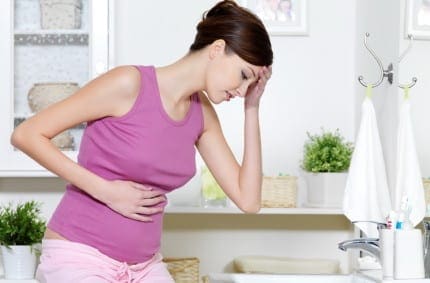Introduction to cramping during pregnancy
Many pregnant women experience cramping during pregnancy, which is usually a cause for concern for the pregnant woman and her family members. In some cases, cramping or abdominal pain will require medical attention immediately, while occasional cramping is normal during pregnancy.
In which cases should you see a doctor when cramping occurs?
If you experience any of the following, it is recommended that you seek medical help this instant:
Cramp During Early Pregnancy
1. If you’re experiencing cramping and see spotting or light bleeding vaginal discharge, this could be a sign of miscarriage. In some cases, it may also be a sign of ectopic pregnancy – when the fertilized egg isn’t implanted in the womb. If you experience either of these, it’s important to seek medical attention right away.
2. CONSTANT or SEVERE CRAMPING during pregnancy can be a sign of stomach virus, food poisoning, kidney infection, or complication of pregnancy.
3. If you’re experiencing discomfort or pain while urinating, it could be a sign of a urinary tract infection (UTI). UTIs can cause cramping and other symptoms like a burning sensation, cloudy urine, or strong-smelling urine. If you think you might have a UTI, it’s important to see a doctor, so they can prescribe antibiotics to clear the infection.
4. If you experience cramping along with a fever or chill, it could be a sign of something serious. Dizziness or faintness are also symptoms that warrant a call to your doctor.
Cramp During Late Pregnancy
1. Cramping in the lower abdomen, along with an increase in vaginal discharge or a change in the type of vaginal discharge (such as it becoming bloody) may be a sign of preterm labor.
2. If you’re experiencing cramps and vaginal bleeding or spotting, it could be a sign of preterm labor.
3. Cramping can indicate labor, especially if the contractions are frequent and strong. If you’re wondering whether or not you might be in labor, pay attention to how often you’re experiencing contractions and how strong they are. Preterm labor is a real thing, so if you’re having any doubts, it’s always best to err on the side of caution and call your doctor.
Causes of Normal or Harmless Cramping during pregnancy
1. Growing Uterus
As your uterus grows, the muscles and ligaments supporting your uterus will begin to stretch. This can cause a dull ache that can be felt on your lower abdomen or groin. You may feel this pain when you change your position such as getting up from a seat or bed or walking. When this happens, it’s best to try and rest.
2. Constipation during pregnancy
Constipation is a common cause of abdominal pain, especially during pregnancy. Hormonal changes in the body during pregnancy can slow down bowel movements, and the growing uterus can press on the rectum, making constipation more likely.
3. Implantation Cramping
For some women, cramping may occur during implantation of the fertilized egg in the uterine lining. This is perfectly normal and should resolve itself once pregnancy has been confirmed.
4. Gas and bloating
Gas and bloating during pregnancy is a result of the hormonal changes that slow down the digestive system, as well as the growing pressure on the stomach and intestines. This can also cause cramping during pregnancy.
Cause of harmful or abnormal Cramping during pregnancy
1. Miscarriage
Miscarriage is the loss of a pregnancy during the first trimester. The first sign is usually spotting or blood in the vaginal discharge. This is normally followed by abdominal pain or cramping later. If this happens, you should see the doctor immediately.
In a typical pregnancy, the fertilized egg will travel to the uterus for implantation. However, in an ectopic pregnancy, the fertilized egg implants itself outside the uterus.
If you’re experiencing cramping or pain, it’s important to seek treatment as soon as possible as the symptoms will only worsen over time. Additionally, you may experience other symptoms such as dizziness and shoulder pain.
3. Preterm labor
Cramping and contractions before the 37th week of pregnancy can be a sign of preterm labor. Normally, these cramps and contractions come at 4-hour intervals. Other changes to look out for include vaginal discharge (increase or change in color), and pelvic pressure (feeling like your baby is pushing down or like you’re going to start your period).
If you experience cramping during your pregnancy, don’t panic. Instead, try to call your doctor right away. This way, you can rule out any potential problems.
Common Questions about Cramping During Pregnancy
Question 1: How to differentiate cramping due to period from pregnancy cramping?
Answer: Many pregnant women experience cramping, but it is usually much lighter than cramping caused by menstruation. However, it can be difficult for some women to tell the difference between the two. If you have other symptoms of pregnancy, such as a missed period or sensitive breasts, it is recommended that you take a pregnancy test to confirm whether or not you are pregnant. If the test confirms that you are pregnant and the cramping does not stop, please seek medical help as soon as possible.











